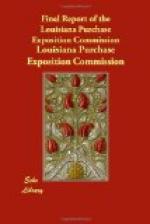That all nations take a deep interest in world’s fairs is made manifest by the large attendance of people from all parts of the globe. It is self-evident that they appreciate the fact that most beneficial results may be derived by all, not only by means of the practical and tangible demonstration and comparison of objects assembled, but through the opportunity afforded for interchange of thought so conspicuously made available to advanced thinkers and workers. And it is hoped and believed that in its own time and in its own way each exposition will accomplish much for the good of both men and women of every country.
It would seem from the division of work as shown at the exposition by the Filipinos and the Indian tribes that women have not only, from the remotest times of which we have record, originated and practiced most of the industrial arts, but, among primitive nations, they still continue to ply the same occupations. The exhibits showed that the work of the men was still that of the hunter and trapper, while the Filipino woman who sat on the floor making cotton cloth, would indicate that it had fallen to the share of women not only to fashion garments, but the material from which they were made. And was not the stick which she so deftly handled, upon which she wound her thread to carry the woof to and fro transversely across the warp of her hand-woven fabric, the forerunner of the swiftly moving shuttle of today? And if the primitive woman still makes garments from the skins which the hunter brings home, and cooks the game which he shoots or traps, and has originated the method of cooking other articles of food, has she not earned for herself the right to be termed the first “home maker?” It is true the home originally had to be maintained by force of arms, but when this necessity no longer existed, and man, “the protector,” had time to examine this woman-made home, he put his ingenuity to work to aid in the increased demands large households made upon women and invented and applied machinery to do the heavy tasks that had theretofore been done by them. He found it a vastly remunerative occupation, and promptly removed her work of spinning, weaving, dyeing, and even the making of every kind of garment, and the preparation of foods, to his factories.
Women did not take kindly to the innovation at first—their occupations were gone—but, with their usual adaptability, they immediately invented new ones. They now had time and opportunity to acquire education, enter the professions, and prepare themselves to take their equal place by the side of men.
President Francis, in his address on opening day, said of the Louisiana Purchase Exposition:




